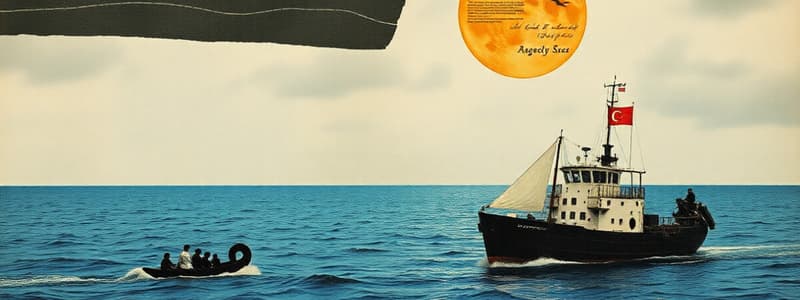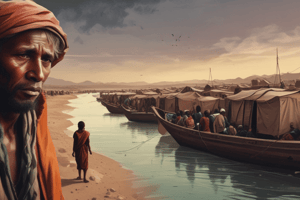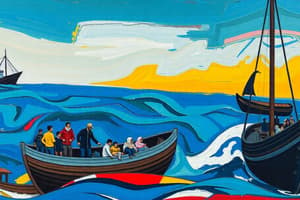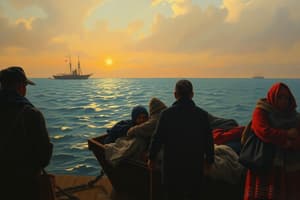Podcast
Questions and Answers
Why did the smugglers choose a cloudy, moonless July night for the crossing?
Why did the smugglers choose a cloudy, moonless July night for the crossing?
- Smugglers prefer July because the seas are generally calmer during this month.
- The darkness decreases the likelihood of detection by the Greek Coast Guard. (correct)
- The temperature in July is ideal for sea travel in the Aegean.
- Cloudy nights reduce the risk of sunburn for the migrants.
What does Ahmed's memory of stories about defective life jackets suggest about the situation?
What does Ahmed's memory of stories about defective life jackets suggest about the situation?
- The life jackets may not provide adequate protection, increasing the danger. (correct)
- Ahmed is prone to exaggerating the risks involved in their journey.
- Ahmed has a deep-seated distrust of authority figures.
- The smugglers are intentionally sabotaging the migrants' journey.
What is the significance of Ahmed's father giving him the Omega Seamaster watch?
What is the significance of Ahmed's father giving him the Omega Seamaster watch?
- The watch is a valuable item that Ahmed can sell upon reaching Europe.
- His father believes the watch will help Ahmed navigate to safety.
- The watch has sentimental value because it belonged to Ahmed's mother.
- It is a symbolic gesture of love and responsibility, given in a moment of high uncertainty. (correct)
What does Ahmed's internal conflict reveal about his understanding of the situation?
What does Ahmed's internal conflict reveal about his understanding of the situation?
How does the phrase "Where was Europe? Where was the rest of the world?" contribute to the narrative?
How does the phrase "Where was Europe? Where was the rest of the world?" contribute to the narrative?
What does the description of the Aegean Sea and sky as 'dark' symbolize in the narrative?
What does the description of the Aegean Sea and sky as 'dark' symbolize in the narrative?
How does the limited visibility affect the psychological state of the people on the dinghy?
How does the limited visibility affect the psychological state of the people on the dinghy?
What does Ahmed's father's commanding yet gentle voice reveal about his character in this situation?
What does Ahmed's father's commanding yet gentle voice reveal about his character in this situation?
How does the mention of Ahmed's deceased mother, sisters, and grandfather impact the reader's understanding of Ahmed's motivations?
How does the mention of Ahmed's deceased mother, sisters, and grandfather impact the reader's understanding of Ahmed's motivations?
What is the significance of the phrase 'Omega Seamaster, a name that seemed ironic now'?
What is the significance of the phrase 'Omega Seamaster, a name that seemed ironic now'?
What is the most likely reason Ahmed's father refused to take the inner tube?
What is the most likely reason Ahmed's father refused to take the inner tube?
Why did the passengers pour water out of the boat?
Why did the passengers pour water out of the boat?
How does Ahmed's memory of his father leading the dabke contribute to the story's meaning?
How does Ahmed's memory of his father leading the dabke contribute to the story's meaning?
What is the effect of the author's choice to include specific sensory details such as the "hard summer rain" and "choppy waves"?
What is the effect of the author's choice to include specific sensory details such as the "hard summer rain" and "choppy waves"?
What does the phrase "as if considering the worth of those inside" suggest about the wave?
What does the phrase "as if considering the worth of those inside" suggest about the wave?
What is the significance of the buoy being "ripped off the rope and tossed into the darkness"?
What is the significance of the buoy being "ripped off the rope and tossed into the darkness"?
How does the incident with the sideways wave contribute to the overall theme of the story?
How does the incident with the sideways wave contribute to the overall theme of the story?
In what way does the author use setting to create a sense of foreboding?
In what way does the author use setting to create a sense of foreboding?
What effect does the abrupt ending have on the reader's experience of the story?
What effect does the abrupt ending have on the reader's experience of the story?
How does Ahmed's emotional state evolve throughout the passage?
How does Ahmed's emotional state evolve throughout the passage?
What does the father's act of giving Ahmed the inner tube and then leaving the boat primarily suggest about his character?
What does the father's act of giving Ahmed the inner tube and then leaving the boat primarily suggest about his character?
The phrase 'Forgive me, my soul. For a moment, I must leave you,' reveals what about the father's internal conflict?
The phrase 'Forgive me, my soul. For a moment, I must leave you,' reveals what about the father's internal conflict?
Considering the collective helplessness of the refugees, what is the most likely reason the smugglers chose an engineering student to pilot the boat?
Considering the collective helplessness of the refugees, what is the most likely reason the smugglers chose an engineering student to pilot the boat?
What does the woman folding the Iraqi man’s clothes 'neatly, as if to make a point that she expected him back' suggest about their relationship and the overall atmosphere?
What does the woman folding the Iraqi man’s clothes 'neatly, as if to make a point that she expected him back' suggest about their relationship and the overall atmosphere?
How does the narrative structure, focusing on Ahmed's perspective, impact the reader's understanding of the events?
How does the narrative structure, focusing on Ahmed's perspective, impact the reader's understanding of the events?
The captain's shame about the motor can be interpreted as?
The captain's shame about the motor can be interpreted as?
The phrase 'They were from a medley of places---Syria, Afghanistan, Iraq---but Ahmed realized from the helpless way they looked at one another that they had one thing in common: none of them could swim,' implies?
The phrase 'They were from a medley of places---Syria, Afghanistan, Iraq---but Ahmed realized from the helpless way they looked at one another that they had one thing in common: none of them could swim,' implies?
Considering the limited resources on the boat, why would people throw bags into the sea?
Considering the limited resources on the boat, why would people throw bags into the sea?
What is the significance of the contrast between the father's initial lighthearted tone ('There is already enough water in this boat') and his subsequent serious actions?
What is the significance of the contrast between the father's initial lighthearted tone ('There is already enough water in this boat') and his subsequent serious actions?
How does referring to the captain as 'just an engineering student' affect the reader’s perception of him and contributes to the story’s overall theme?
How does referring to the captain as 'just an engineering student' affect the reader’s perception of him and contributes to the story’s overall theme?
Flashcards
Buoy
Buoy
A floating object used as a marker.
Towrope
Towrope
A thick rope used for towing or mooring a boat.
Dinghy
Dinghy
Small boat, often inflatable.
Confer
Confer
Signup and view all the flashcards
Whitecaps
Whitecaps
Signup and view all the flashcards
Taut
Taut
Signup and view all the flashcards
Pitched and Bucked
Pitched and Bucked
Signup and view all the flashcards
Tipped
Tipped
Signup and view all the flashcards
Ebb
Ebb
Signup and view all the flashcards
Whirling
Whirling
Signup and view all the flashcards
Inflatable Dinghy
Inflatable Dinghy
Signup and view all the flashcards
Panic
Panic
Signup and view all the flashcards
Defective
Defective
Signup and view all the flashcards
Powerlessness
Powerlessness
Signup and view all the flashcards
False words of comfort
False words of comfort
Signup and view all the flashcards
Aegean Sea
Aegean Sea
Signup and view all the flashcards
Smugglers
Smugglers
Signup and view all the flashcards
Invisibility
Invisibility
Signup and view all the flashcards
Terrified
Terrified
Signup and view all the flashcards
Ironic
Ironic
Signup and view all the flashcards
Lightening the Load
Lightening the Load
Signup and view all the flashcards
"Allahu Akbar"
"Allahu Akbar"
Signup and view all the flashcards
Inner Tube
Inner Tube
Signup and view all the flashcards
Treading Water
Treading Water
Signup and view all the flashcards
Medley
Medley
Signup and view all the flashcards
Ashamed
Ashamed
Signup and view all the flashcards
Pilot
Pilot
Signup and view all the flashcards
Thankless duty
Thankless duty
Signup and view all the flashcards
Oblong
Oblong
Signup and view all the flashcards
Study Notes
- Set on a cloudy, moonless July night, a group of refugees attempts to cross the Aegean Sea.
- They aim to avoid detection by the Greek Coast Guard.
- The inflatable rubber dinghy is low in the water, only 10 centimeters above the surface.
- Eighteen men, three women, and four children are crowded into the boat.
- Some wear ill-fitting life jackets, and few know how to swim.
- One woman expresses fear of drowning if the motor fails.
- Ahmed Nasser, a fourteen-year-old boy, hugs his small life jacket.
- He recalls stories of defective life jackets that cause people to sink.
- Ahmed's father attempts to reassure him, despite the evident danger.
- The smell of bodies and the sight of terrified faces contradict his father's calm demeanor.
- Ahmed notes the deflating boat and the potential motor failure
Journey and Apprehension
- The coast of Turkey is less than ten kilometers from the Greek island of Lesbos.
- Ahmed can't see any lights from land or other boats, heightening his sense of isolation.
- He wears his great-grandfather's Omega Seamaster watch, a detail that now seems ironic.
- Ahmed admits to his father that he can't swim.
- People lighten the load by throwing bags into the sea.
- A woman with a baby starts crying, prompting Ahmed's father to offer comfort.
- The father removes an inner tube and puts it over Ahmed's head.
- He tells Ahmed he must leave him for a moment.
- Ahmed tries to reach for his father but is restricted by the inner tube around his arms.
- His father jumps into the water.
- Ahmed yells after his father, who says that they need to pull the boat.
- The father asks if anyone else can swim.
- A man with an Iraqi accent volunteers to help.
- The captain, an engineering student from Homs, also offers to swim.
- Ahmed tries to return the inner tube to his father, but he refuses it.
Action and Reminiscence
- The swimmers loop the boat's towrope around a buoy.
- They begin to pull the boat, with Ahmed's father in the lead.
- Passengers scoop water out of the boat with bottles.
- Ahmed feels pride in his father's actions.
- Ahmed recalls happy memories of family barbecues and dabke dances in Aleppo.
- The wind picks up, choppy waves rock the dinghy, and water spills into the boat.
Disaster
- A hard summer rain begins to fall.
- A large, sideways wave pulls the dinghy.
- The wave sweeps over the swimmers, making them disappear.
- The wave rips the buoy off the rope.
- Silence, then shouting, and flashlights are shone across the water.
- The captain and the Iraqi swimmer resurface.
- Ahmed sees what he thinks is his father in the distance.
- Ahmed shouts for his father, but there is no response.
- Ahmed only sees endless waves.
Studying That Suits You
Use AI to generate personalized quizzes and flashcards to suit your learning preferences.
Related Documents
Description
A group of refugees attempts a perilous crossing of the Aegean Sea. Overcrowded in a small rubber dinghy, they fear detection and drowning. The story follows Ahmed, a young boy, as he faces the dangers of the journey, highlighting themes of fear and uncertainty.




